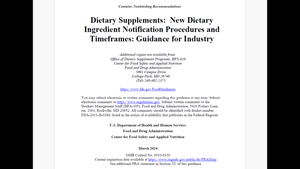Strong Science
Science matters for any reputable business, including when contract manufacturing comes up. Christopher Baker explains how the two intertwine.

Every product is a sum of its parts and each product is only as good as its weakest link. That’s why your company needs strong research to support the effectiveness and safety of every ingredient in your product, as well as the product as a whole. To maximize sales and profits over the long term, it’s crucial that a company perform due diligence both before and after your product’s formulation is finalized and pushed into the market.
Today this is easier than ever due to improvements in the dietary supplement industry that have increased legitimacy, safety and efficacy. The first change, dating to the mid-’90s, was the establishment of manufacturing and quality control standards based on Good Manufacturing Practices (GMP). The result of GMP has been batch-to-batch consistency. This then provides the basis for scientifically legitimate clinical testing, the second important improvement. In the absence of a consistent product, clinical results both in terms of safety and efficacy had little meaning.
Therefore as a first step, careful attention needs to be paid by both manufacturers and those buying ingredients to GMP guideline adherence and labeling. Here are some thoughts on the process you should go through as you prepare your next product for sale:
* Choose ingredients with strong regulatory compliance and clinical science research behind them. It’s tempting to include the latest fad supplemental ingredient mentioned on Dr. Oz’s show or in other places. While many of these supplements have passed the test of time and science, others have not. Many companies have had to deal with the crisis that comes when one ingredient is found to be tainted or causes unwanted or harmful side effects. Many companies learned this lesson the hard way when they added DMAA, a natural stimulant derived from geraniums, to their fat-loss and energy formulations. Unfortunately, this ingredient reacted badly with caffeine and ingestion led to increased blood pressure and cardiovascular issues.
Lesson learned: To ensure your product’s success, make sure to verify the effectiveness and safety of every ingredient you include in your formulation.
* Use manufacturers with long track records for quality. Another problem companies sometimes encounter with supplemental ingredients is that a less expensive provider may deliver a tainted batch. Not only is this potentially harmful to your consumers, but it can be damaging to your product’s and company’s reputation. That’s true even if the ingredient doesn’t cause any harm— it may simply mean that your product doesn’t meet the claims of your supplement info or nutrition panel. The best advice is to stay vigilant, periodically testing ingredients you’re buying in bulk. Using a large company with a good reputation, even if it’s more expensive, will help your bottom line in the long run. Testing and verifying will help you sleep better at night—or it will uncover any small problem before it becomes a nightmare.
* Test your products after formulation for additional claims. While you can use the claims based on the ingredients in your product, it’s a great idea to perform additional clinical research on your product after formulation and before market. This will not only confirm these prior claims (or reveal any problems with individual supplemental ingredients), but it may also allow you to make additional claims that are specific to your product. Of course, the best way to achieve this is through human clinical trials. This added step will help your product stand out against competing products. You’ll get very specific data points that you can include in your marketing materials, which appeals to retailers and consumers alike.
* Perform research on your product to reduce risk to your company. In addition to verifying the claims on the ingredients in your product, clinical trials performed after formulation will also drastically reduce the risk of a recall. You’ll not only show that the product is safe but you’ll protect your consumers and your company. Recalls not only taint the reputation of the product, but they also cause significant long-term damage to a company’s bottom line. Performing research on both the ingredients and your product’s final formulation are among the best ways to prevent this.
* Strengthen your product; strengthen your claims. Choose well-researched ingredients, and buy them from reputable GMP-compliant companies when you’re formulating your product. Then follow up with quality clinical trials before market. This way you’re investing in your new product as well as your company’s future. You’ll be able to make stronger claims, helping you gain more retail exposure. And you’ll ultimately gain a better reputation and greater long-term profitability for your company.
Christopher Baker is CEO of Global Clinicals, Inc., an OTC and dietary supplement CRO based in Los Angeles CA, www.GlobalClinicals.com.
About the Author(s)
You May Also Like




.png?width=800&auto=webp&quality=80&disable=upscale)